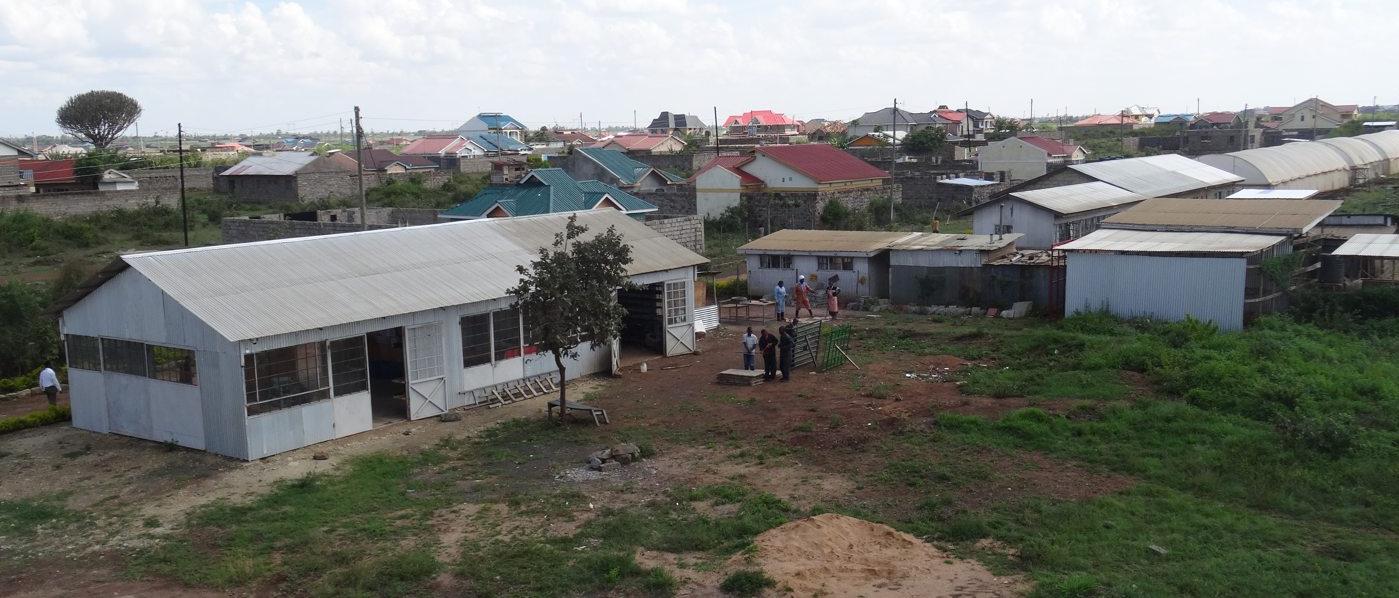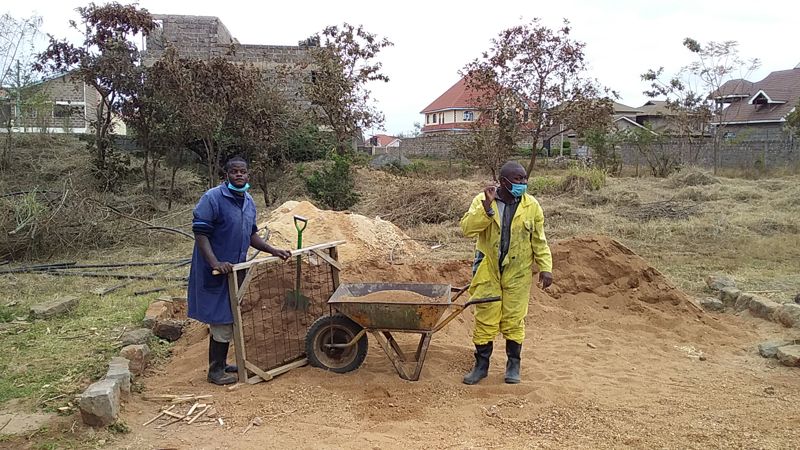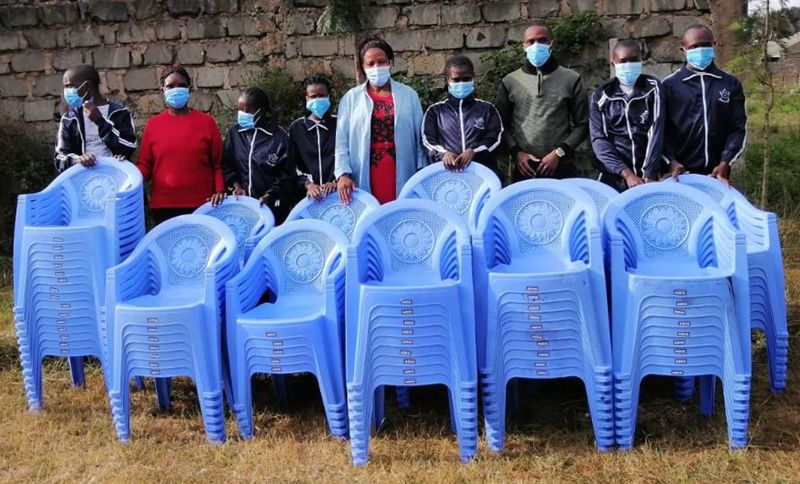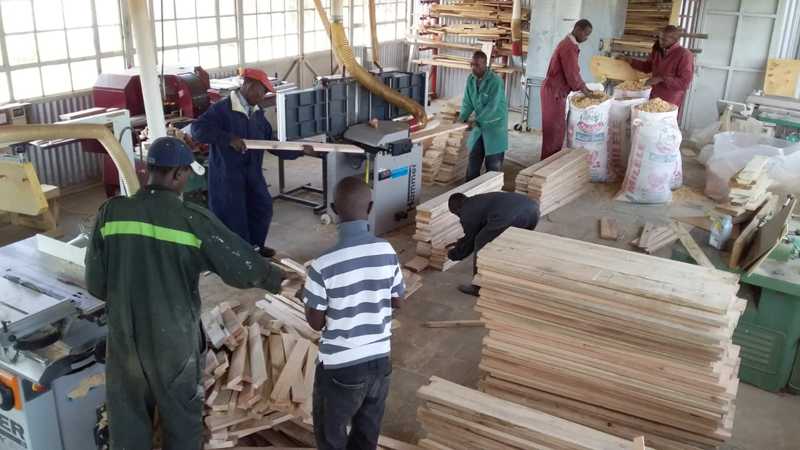Maria Magdalena Sheltered Workshops
Our aim
After school the adult students with disabilities should live in Gatuanyaga as independently as possible. They can work in agriculture or in other different workshops. So they can contribute to their living.
Concrete department
Arnold and David sift sand together for the production of ventilations and pipes. In the Concrete Department, they can be employed and promoted according to their abilities and inclinations.
They really feel at home in this safe environment.
Salim, the head of concrete production, works with the trainees with great motivation.
More funds are needed for mould making. In future a Piki Piki is needed to deliver ventilation blocks etc. to the customers and retail shops.
Help the workshops to stand on their own feet!
Sheltered Workshops – a vision for Kenya?
A commission for special education in Kiambu-sub-county visited the Sheltered Workshops.
A few public primary schools have separate classes for children with disabilities. The headmasters of these schools are considering what to do with these children after grade 8.
The Maria Magdalena Sheltered Workshops are a model for this.
We are very excited to see the development for children with disabilities.
The rain can come!
During the rain season, the entrance to the Sheltered Workshops was often completely overflooded. Workshop manager Salim and the workers produced culverts. Then built them into the entrance.
Now the concrete department also produces big pipes. There is a great need for culverts in the rainy season.
Product development at the Sheltered Workshops
Julius, the head of the metal workshop, is working on the series production of chairs.
Specifications: bending technology, as little sawing and welding as possible, and good work preparation.
Julius produced the prototype "chair" with a simple bending device.
Now a manual mechanical bending machine is needed in which the bending positions and bending angles can be specified by means of adjustable stops. Julius and Hubert want to construct this machine. This device is necessary for series production.
Hopefully they will be successful!
The employees with disabilities should be able to do as many work steps as possible independently.
MAMAPA: Parent organisation at the Sheltered Workshops
Nancy Ireri - teacher at the Sheltered Workshops - looks after the parents' group. She is fully committed to lobbying for people with disabilities.
The parent organisation of the Special School and Sheltered Workshops now got a tent for 100 people from the NCPWD (National Council for Persons with Disabilities).
Patron Nancy also persuaded a Kenyan sponsor to donate 100 chairs. The trainees received the chairs on behalf of the MAMAPA board.
The tent and chairs can also be used by the Sheltered Workshops. The fees incurred by lending them to third parties will benefit MAMAPA.
No sponsor for running costs since 2021
The Benjamin Foundation Netherlands has decided to end its support for the running costs over 35,000 € per year. This is a serious turning point for the Sheltered Workshops.
But the school management and the parents want to keep the facility going.
Now savings must be made. Some employees had to be fired. But the workshops remain. They have to contribute more to the upkeep of the facility. The MMSW team has started some activities to get sponsors in Kenya. But this is not easy.
For us it is important that persons with disabilities can live and work in the Sheltered Workshops.
Our small organization cannot make up for the large deficit. However, we want to support the Sheltered Workshops as much as we can. The success story for people with disabilities must continue.
Help us and become a sponsor!

Families in need
It is difficult for some families to buy enough food in the Corona crisis. Many parents are out of work. The last harvest was quite good, but the food prices have increased sharply.
Teacher Nancy and teacher Juma take care of the young adults with disabilities. They keep contact with their parents. They provide families in need with food parcels with rice and corn flour.
But now all supplies are distributed and used up.
We need your support for further food donations!
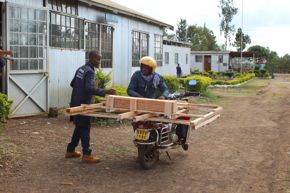
Artisan Stephen cannot come to work
The manager of the wood workshop is not allowed to work.
Carpenter Stephen lives in the Kilimambogo region, only about 15 km from the Sheltered Workshops. His home is outside the Greater Nairobi district.
Because of the curfew, he is not allowed to leave his home area.

Artisan Julius installs railings in an orphanage
The metal workshop has produced railings and stairs for Watoto Wenye Nguvu. The orphanage is not very far from the Sheltered Workshops. All parts were delivered and Julius started with the installation.
However, he is not allowed to go back to Munyu in the evening because the orphanage is in a different district. He had to rent a room and he lives there until all the work is done.
Everyone is waiting for the region's corona-related restrictions to be lifted again.
Here you can see Julius repairing the extraction system.
Safety at work - help us!
Great efforts are made in the Sheltered Workshops to improve safety at work. Health and safety is underdeveloped in many areas of Kenya. We want to change that! Our goal is to raise awareness among all workers about the importance of occupational safety.
Safety glasses, welding goggles, work gloves, hearing protection, overalls, work coats and especially protective shoes are required. We also want to improve machines and equipment such as chip extraction in the wood workshop.
We need your support for the necessary funds!
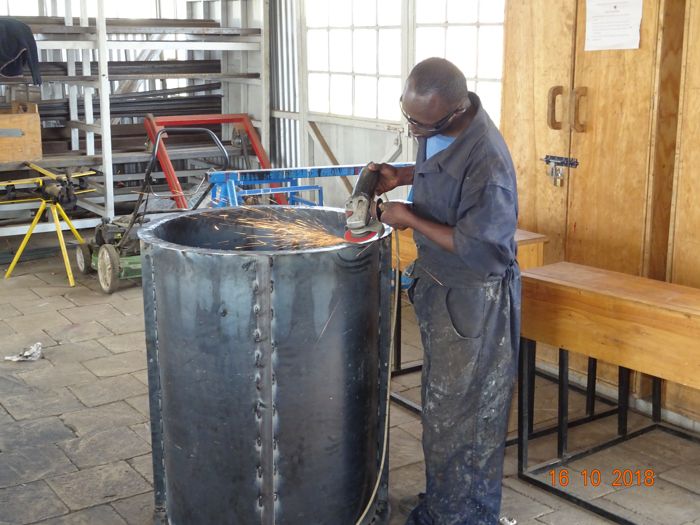

Farming
The cows and chickens have to be cared for during the Corona crisis. Vegetable cultivation continues too. There are problems outdoors due to heavy rains. In the greenhouses, the plants grow protected from the rain.
The life assistants who normally take care of people with disabilities help in agriculture.

Will there soon be jam in the Sheltered Workshops?
It's incredible. Headmaster Peter Syanda and teacher Moses Muchiri absolutely wanted to learn how to cook jam when they visited Germany in October 2019. The two students cut pineapples into small pieces, stirred sugar and pectin into the mass, cooked it and filled the jam into jars. They boiled the glasses beforehand, because in Munyu no hot water comes out of the tap.
The result was a delicious pineapple jam.
How to make pineapple jam
Moses organized a jam training in the Sheltered Workshops. But first the mixer failed to shred. But the team still goes on working.
Recipe for super delicious pineapple jam
The chefs at the small Café Lindenhof have learned to cook delicious pineapple jam. The recipe is also ideal for mango jam!
That's how it's done:
Click here for the recipe ...
Waste separation in the Workshops
Where to put the trash?
There is no garbage collection in Munyu.
Since 2018, many efforts have been made in the Maria Magdalena Sheltered Workshops to properly dispose of the waste generated. Now all garbage is separated.
There are containers for compost, recycling and incineration.
With the help of our man on the ground Hubert Senger, an oven was built for the incineration of residual waste.
It is important to train all employees and people with disabilities.

How do the adults with disabilities live?
Our association has provided funds for the construction of accommodation. In January 2014, the first group of young adults with disabilities was able to move in. Now over 40 people with different disabilities and their life assistants live there.

The young adults are proud that they can now live independently in Gatuanyaga. With the help of social workers, they learn to organize themselves and take over activities in the household.
The Benjamin Foundation from the Netherlands gives benefits to the running costs.

Why do we need workshops?
Many of the young people with disabilities have no opportunities in the private sector. For them, a special environment in which they can live and work is needed. With their work they contribute to their living.

How do the adults with disabilities work?
James Jumah, deputy headmaster of the Special School is in charge for monitoring and educational guidance. The residents work in workshops with an artisan or a workshop manager. They produce different goods, e.g. in the wood workshop they produce furniture like tables, desks, wardrobes and chairs for schools.

Agriculture and horticulture
Agriculture has been gradually improved with a large water reservoir, a well and a drip irrigation system. As a result, earnings increased significantly. The vegetables are prepared in the kitchen of the Special School and Sheltered Workshops. Surpluses are sold on the local market.

Metal workshop
In the metal workshop people with disabilities make doors, gates, window frames and balcony railings for the local market.
We want to improve the safety at work in all the workshops.

Wood workshop
The wood workshop produces school furniture, such as tables, chairs and cabinets for the newly built school in Munyu and for private clients.
Through donations in 2017, we were able to send a container with woodworking machines to Munyu. Now the woodworkshop can work professionally.
In 2029 they procuced more than 200 chairs and desks for local schools.

Concrete workshop
In this workshop people with disabilities produce stones for ventilation.
These stones are built into new homes to get in fresh air. The artisan builds the molds and the trainees learn how to produce the stones.
Ventilations sell well on the local market.

Café Lindenhof
On the site of the Sheltered Workshops there is a small restaurant, the "Cafe Lindenhof". Here, the persons with disabilities sell food and drinks. The café is situated close to Garissa Road, the main road.
Typical Kenyan food like mandazi, chapati and chai is served and customers come from early in the morning until late in the evening. Recently there is even pizza being served on Fridays.
How will it go on?
Together with our Kenyan partners, we have prepared a development concept for the entire site, with housing units for the disabled, a leisure area, a guest house, different workshops, the agricultural area and the Café Lindenhof.
A large hall for assemblies is to be built. More workshops will be built in the next few years.
The living area also needs to be enlarged and must be adapted to the needs of disabled people.
How can we do that?

Help us!
We need your donations in order to put this trendsetting model project into practice.
Your donation will help young people with disabilities in Kenya have a future!
Here you can help immediately...

